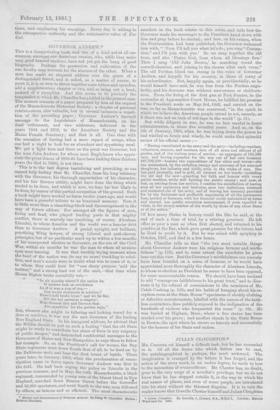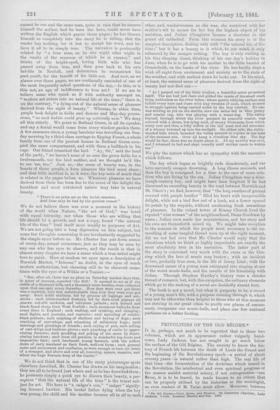her example, So, on the President's call for troops, the
By Ma. CHESTER sot himself a difficult task, but he has succeeded State regiments went down South first of all, to be fired on by in it. Of all the forms into which fiction can be cast, the Baltimore mob, and bear the first brunt of battle. Three the autobiographical is, perhaps, the most awkward. The years later, in January, 1863, when the proclamation of eman- imagination is cramped by the fetters it has forged, and the cipation came in force, again Governor Andrew was first in action of the story must, in an undue degree, be made to bow the field. Ho had been urging the policy on Lincoln in the to the necessities of vraisenablance. Mr. Chester has, no doubt, previous summer, and in May, the 54th Massachusetts, a black gone to the very verge of a novelist's privilege, but we do not regiment, commanded by young men of the bluest blood in New know that he has stepped outside it, in the way in which the England, marched down Beacon Street before the Govergor real names of places, and even of some people, are introduced and 50,000 spectators, and went South to the war, soon followed into his story without the thinnest disguise. It is in vain the by others, as famous and as efficient, The most characteristic reader knows that Greville Chester himself and Julian Cloughton " Memoir and Retrandecences of aovernor Andrew. By Pelog w. Chandler, Boston : 7, Julian Cloughion. By Gropille ,1, Chester, B.A., 11.B.A.I, London: Marcus 'cannot be one and the same man, quite in vain that he assures himself the author, had he been. the hero, could never have
-written the English which graces these pages ; he has thrown himself so completely into the story he is telling, that the
reader has nothing for it but to accept his word, and be- lieve it all to be simply true. The narrative is professedly related by " a lone man, as he sits night after night in -the vaults of the museum of which he is curator," and thinks of the bright-eyed, loving little wife who has passed away from him, and then goes back to his own lad-life in Norfolk, and determines to reconstruct his past youth, for the benefit of his little son. And now, as we glance over these pages, we are continually reminded of one of
the most frequently asked questions of the day, Is this, or is this not, an age of indifference to true art P If we are to
believe some who speak as if with authority amongst us, ." modern art enters into no natural life of the time;" there is, on the contrary, " a dying-out of the natural sense of pleasure derived from the sight of beauty." Whereas, in olden time, people took delight in fields and flowers and May-day proces- sions, "no such habits could grow wp naturally now." We deny all this utterly. We point to Bethnal Green, in all its squalor, and say a denial would come from every window-garden there.
A few summers since, a young barrister was travelling one Sun- day morning by a third-class carriage to Epping Forest; a whole family from one of the poorest houses in Bethnal Green occu- pied the same compartment, and with them a bullfinch in his oage. Our friend remarked the bird. " Ay, Sir," said the head of the party, " we haven't none of us seen the green fields for a twelvemonth, nor the bird neither, and we thought he'd like to see 'em, too." Just so,—the sense of beauty was, in the hearts of those people, a keen pleasure the bird must share ; and that little incident is, as it were, the key-note of much that is related in the pages before us. Whatever pleasure we have derived from them has been due to the sense of the delight the humblest and most untutored nature may take in natural beauty.
" There is no price set on the lavish slimmer,
And June may be had by the poorest corner."
We do not believe there was ever a moment in the history -of the world when Nature, "the art of God," was loved with equal intensity, nor when those who are willing that life should be a growth, and not a copy, found "the natural life of the time" lend itself more readily to purposes of Art.
We are not going into a long digression on this subject, but some few thoughts concerning it are involuntarily suggested by the simple story before us. Mr. Chester has put down scenes -of every-day, actual occurrence, just as they may be seen by -any one who has eyes to observe, and the result is that in almost every chapter we have a scene which a true artist might love to paint. Here at random we open upon a description of Norwich Market, " hideous," no doubt, in the eyes of much modern {estheticism, but chancing still to be observed some- times with the eyes of a Wilkie or a Teniers :—
" But, after all, there was no place on Saturday market-days that, in point of interest, equalled ' the Hill.' It seemed to me as if the cattle of a thousand hills, and a thousand more besides, were collected upon that one spot every Saturday. How they were ever got there -was a mystery, only less unfathomable than how they were ever got away. Such noble stallions, led by grooms all leggings and ash- sticks ; such zebra-marked donkeys, led by dark-eyed gipseys all .sinews, red-silk neckties, and velveteen jackets ; such horned and black-faced sheep from West Norfolk ; such enormous bullocks from every shire in England ; such rushing, and crushing, and charging ; such flights, and pursuits, and captures ; such squealing of recalci- itrant porkers ; such neighing of stallions and baying of dogs ; such cracking of cart-whips, and whacking of refractory hogs ; such meetings and greetings of friends ; such crying of pies, such selling of cart-whips and leathern gloves ; such punching of cattle by appre- ciating farmers ; such prodding and poking of the same by depre. oiating butchers ; such stout old graziers, in wonderful top-boots and impossible hats ; such handsonie young farmers, with the yellow .down of early manhood on their fresh, well-cut faces ; such general -noise and excitement and confusion, as were enough to turn the brain of a stranger, and above and over all, towering, square, massive, and /I ilent the huge Norman keep of the Castle."
We do not think that in one of the many picturesque spots .olsewhere described, Mr. Chester has drawn on his imagination ; they are all to be found just where and as he has described them ; he possesses simply a quick eye to discern their beauty, a per- eoption "that the natural life of the time " is the truest sub- ject for art. His hero is "a cadger's son," " cadger " signify- ing licensed hawker. His brutal father dying when the boy -was young, the child and his mother became all in all to each other, and, washerwoman as she was, she contrived with her mother's wit to secure for her boy the highest object of his ambition, and Julian Cloughton became a chorister in the
grand old cathedral. From this moment his story is of the simplest description, dealing only with "the natural life of the time ;" but it has a beauty in it which, to our mind, is only enhanced by the meagre setting. The boy is only waiting in his tiny sleeping closet, thinking of his one day's holiday in June, when he is to go with his mother to the little hamlet of Greenslaith, on the banks of the river. Ho has hardly slept a wink all night from excitement and anxiety as to the state of
the weather, and with earliest dawn ho looks out. In his mind, at least, the natural sense of pleasure derived from the sight of beauty had not died out
" As I peeped out of my little window, a beautiful scene presented itself. The sun had just risen and gilded the masts of the small craft lying motionless on the river below, whose gently eddying surface was tufted every hero and there with tiny wreaths of mist, which seemed to struggle against being carried under by the lazy current. No one was stirring as yet on the staiths, save one sailor-lad in blue jersey and scarlet cap, who was playing with a water-dog. The valley beyond, through which the river pursued its peaceful course, was covered with a dense, low-lying mist, of snowy whiteness, from which every now and thou a lofty willow or the tall mast and red streamer of a wherry towered up into the sunlight. On either side, the richly- wooded hills which bounded the valley seemed to rejoice in the heat of the summer sun. Over all hung a cloudless blue sky. The day would be fine, there was no doubt about it. All my anxiety was over, and I returned to bed and slept soundly until mother came to waken me."
We pity the nature which has no sympathy with the narrative which follows.
The day which began so brightly ends disastrously, and our hero narrowly escapes drowning. A long illness succeeds, and then the boy is consigned for a time to the care of some rela- tives who are living by the sea. Julian Cloughton was a nine- teenth-century boy, and might have been forgiven if he had discerned no exceeding beauty in the road between Norwich and St. Olave's ; we find, however, that " the long swathes of ground covered with purple heather " filled his heart with inexpressible delight, while not a bird flew out of a bush, not a flower opened its petals by the wayside, without awakening fresh sensations of pleasure. In the ruined tower of Ernsey Church lived the reputed " wise woman " of the neighbourhood, Dame Goodram by name ; Julian soon made her acquaintance, and her story and his own are thenceforth mixed up. We might take exception to the manner in which the people most necessary to the un- ravelling of some tangled thread turn up at the right moment, did we not feel sure that Mr. Chester would reply that the situations which we think so highly improbable are exactly the most absolutely true in his narrative. The latter part of the story is concerned very much with the curse or the bles- sing which the love of music may bestow ; with an incident or two, probably true ones, in the life of Jenny Lind ; with the downward career of a young man entrapped into singing at one of the worst music-halls, and the results of his friendship with Julian. Through Stephen Hartley's history runs a slender thread of romance, but, with this exception, the ordinary elements which go to the making of a novel are decidedly absent here.
The book is not a novel, but what it purports to be, a record of a young man's life, with a purpose running through it, which may not be otherwise than helpful to those who at this moment are striving in our great cities to purify our places of amuse- ment, reorganise our music-halls, and place our few national pastimes on a better footing.



































 Previous page
Previous page